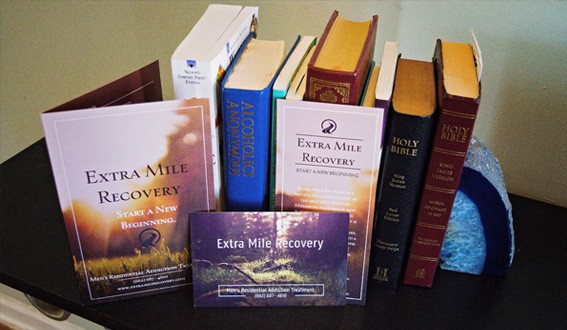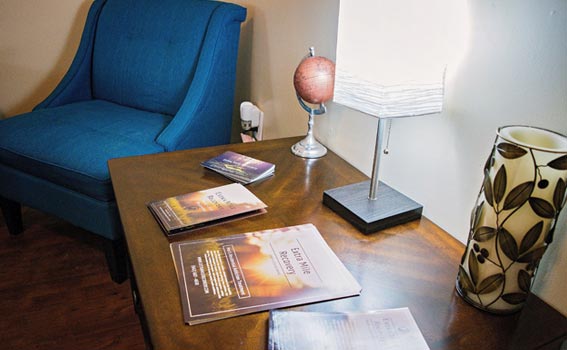The Extra Mile
Recovery Approach
At Extra Mile Recovery, we not only believe in treating each client with the compassion, dignity and respect they deserve, we believe in treating each person as an individual. To accomplish that, our addiction recovery team considers every aspect of an individual’s personal relationship with addiction. By taking this holistic, client-first approach with our recovery services, we can identify, address, and begin to heal the source of each client’s substance use disorder.
The Start Of A New Beginning
Extra Mile Recovery is a place where men come to heal physically, mentally, emotionally, and spiritually, but it’s also a place where they come to fight for the sober lives they deserve. Our supportive addiction rehab center in Mississippi is the ideal space to get a fresh start and focus on yourself, because everywhere you look, you’ll find people who understand what you’re going through and are committed to helping you find lasting sobriety.
The road to recovery doesn’t stop once you leave rehab, and our promise to you is that our support won’t either. For us, it’s only the beginning of our commitment to go The Extra Mile.
Our Recovery Services
In all of our recovery services, we take an evidence-based approach to addressing the underlying causes of addiction so that our clients can begin their recovery in full. We look at the complicated reasons someone begins using and abusing addictive substances. We use this as a starting point, and then work on things like trigger identification, behavioral analysis, and the development of healthy coping mechanisms so that our clients can lead a healthier, substance-free life.
During rehab at Extra Mile Recovery, we use a variety of treatments and therapies to help our clients reach their recovery goals, adjusting each treatment plan to each client’s specific needs. Our addiction recovery services include:

Individual Counseling
Clients regularly meet one-on-one with a licensed substance abuse counselor to identify and address the roots of their addiction. We investigate with the client what their unmet needs were that led them to substance use, why they first tried their particular addictive substance, what parts of their life make it most difficult to stay clean, and other underlying causes of their addiction. By exploring these topics, we can help clients better cope with their addiction’s triggers, and provide them with healthier alternatives to using drugs or alcohol to respond to negative stimuli.


Group Therapy
One of the best ways for clients to understand themselves, and their addiction, is in relation to others. In our men-only group therapy sessions, clients have a safe space to speak about their experiences, celebrate each other’s growth, and support each other in their struggles. By discussing coping tools, learning from one another, and developing empathy for group members, our clients both grow as men and within their support network. This is one of the reasons why we keep our census small — to make sure that everyone’s voice is heard.

Family Therapy & Education
During private family therapy sessions, clients and their loved ones are encouraged to communicate more clearly and honestly. It’s not uncommon for loved ones to struggle to understand the client’s experience, or for clients to not know what their friends and family have been going through behind the scenes. The process of family therapy strengthens a client’s bond with their support network, helps educate loved ones on the disease of addiction, and focuses on relieving some of the pain that all involved have been experiencing.


12-Step Immersion
The 12 Steps is one of the world’s most widely used models for getting sober and entering life in recovery. We offer four 12 Steps meetings per week — 3 offsite, 1 onsite — for clients to take their first steps into a system that offers the lessons and structure that many people find to be helpful for a lifelong recovery. Clients work with a recovery specialist to define the 12 Steps around their personal beliefs and addiction. Our 12-step programming is a flexible model that helps clients make, and track, meaningful progress.

Dual-Diagnosis Treatment
Without careful management, a dual-diagnosis can add complexity to the process of treatment. Our therapy is designed to properly address these complicated situations. Many who suffer from addiction are diagnosed with a co-occurring mental illness like depression, anxiety, or PTSD at the same time. These conditions often feed into each other, making symptoms more severe and difficult to manage. We treat both halves of a dual diagnosis individually, but at the same time, to give each condition the attention it needs while addressing the client’s whole health.


Eye Movement Desensitization Reprocessing (EMDR)
EMDR is a trauma-focused therapy that makes living with the effects of trauma — which can play a major role in addiction — more manageable. During EMDR, we help the client identify the sources, and triggers, of their trauma. Then, work is done to associate both the trauma and its triggers with new thought patterns and behaviors, which desensitizes the client to their trauma. Few clinicians in the country are as experienced in the science of EMDR as Rod Farrar, our Clinical Director and professional specialist in this type of therapy.
Apply For Treatment
Complete the Form Below to Start Your Treatment Application Today
Evidence-Based Therapeutic Techniques
at Extra Mile Recovery
We use several modalities of therapy to help our clients grow, from highly specialized therapies, to counseling methods that are more flexible and adaptable to a unique situation. By doing this, we can treat clients on an individualized basis, in line with their unique case. A few of our key modalities include:
Cognitive Behavioral Therapy
(CBT)
CBT helps a client understand the “why” behind their actions, and better respond to negative thoughts so they can make healthier choices.
This therapy is based on a simple principle: what we think influences how we act, and how we act also influences what we think. During CBT, clients analyze the relationship between their feelings and behaviors, and reframe them as things that can be controlled or changed.


Dialectical Behavioral Therapy
(DBT)
DBT is a more specific form of CBT, and is useful for helping clients make the best of their negative circumstances and move forward with their lives with a new mindset.
Clients in DBT work to forgive themselves, manage their emotions, and even accept pain as a natural part of the healing process. In this sense, DBT has a more practical focus on helping clients learn how to live with difficult thoughts and feelings.
Active Journaling
Active journaling, an effective technique used for self-reflection, helps clients process what they’ve learned during treatment and therapy sessions by writing about their experiences at the end of each day.
Then, in the morning, groups gather to go over these journals and reflect on these lessons further. It’s an important way we help our clients retain their knowledge and growth, and discuss how they can apply that knowledge to life in recovery.

Holistic Recovery Services
at Extra Mile Recovery
Addiction can wreak havoc on someone’s whole health, which is why we offer recovery services that heal the mind, body, and spirit together. We want our clients to get clean and take care of their bodies, but we also want to make sure they’re mentally and emotionally prepared for life in recovery, no matter how much help they need. We’re ready to meet our clients on their level and help them heal at their own pace, and in their own way. Our diverse range of addiction recovery services allow us to do just that.

